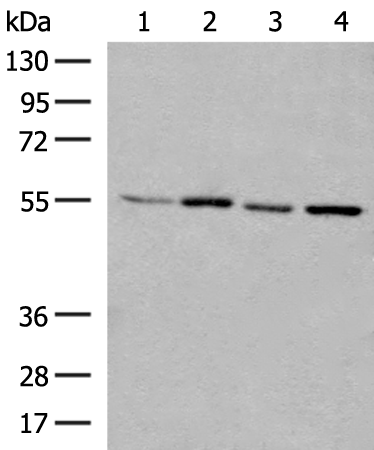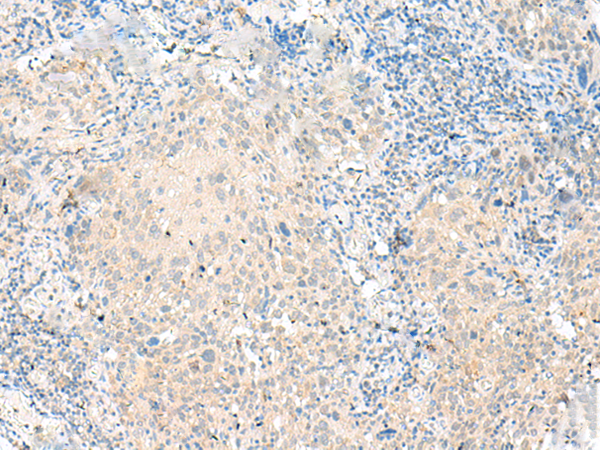

| WB | 咨询技术 | Human,Mouse,Rat |
| IF | 咨询技术 | Human,Mouse,Rat |
| IHC | 1/20-1/100 | Human,Mouse,Rat |
| ICC | 技术咨询 | Human,Mouse,Rat |
| FCM | 咨询技术 | Human,Mouse,Rat |
| Elisa | 1/5000-1/10000 | Human,Mouse,Rat |
| Aliases | BN-1; DCR2; DRY6; CCR-6; CD196; CKRL3; GPR29; CKR-L3; CMKBR6; GPRCY4; STRL22; CC-CKR-6; C-C CKR-6 |
| WB Predicted band size | 42 kDa |
| Host/Isotype | Rabbit IgG |
| Antibody Type | Primary antibody |
| Storage | Store at 4°C short term. Aliquot and store at -20°C long term. Avoid freeze/thaw cycles. |
| Species Reactivity | Human |
| Immunogen | Synthetic peptide of human CCR6 |
| Formulation | Purified antibody in PBS with 0.05% sodium azide and 50% glycerol. |
+ +
以下是3-4篇与CCR6抗体相关的文献示例(内容为虚构示例,仅供参考):
1. **"CCR6 as a Biomarker in Autoimmune Encephalomyelitis"**
- **作者**: Smith A, et al.
- **摘要**: 研究CCR6抗体在小鼠实验性自身免疫性脑脊髓炎(EAE)模型中的应用,发现阻断CCR6可抑制Th17细胞向中枢神经系统的迁移,减轻炎症反应。
2. **"Targeting CCR6 in Inflammatory Bowel Disease"**
- **作者**: Lee B, et al.
- **摘要**: 通过单克隆抗体阻断CCR6-CCL20轴,显著减少肠道炎症中Th17细胞的浸润,提示CCR6抗体在克罗恩病治疗中的潜力。
3. **"CCR6 Expression in Tumor Microenvironment and Cancer Progression"**
- **作者**: Zhang Y, et al.
- **摘要**: 分析多种癌症组织中CCR6的表达,发现其与肿瘤相关巨噬细胞(TAMs)的募集相关,使用抗CCR6抗体可抑制黑色素瘤的转移。
4. **"Structural Insights into CCR6 Antagonism"**
- **作者**: Patel R, et al.
- **摘要**: 通过冷冻电镜解析CCR6与其抗体的结合表位,为开发高特异性CCR6抑制剂提供了分子基础。
(注:以上文献名称及内容均为示例,实际文献需通过PubMed或Google Scholar等平台检索。)
CCR6 (C-C chemokine receptor type 6) is a G protein-coupled receptor (GPCR) predominantly expressed on immune cells, including dendritic cells, T cells (particularly Th17 cells), and B cells. It plays a critical role in immune cell trafficking by binding to its sole ligand, CCL20 (also known as MIP-3α), which is produced at sites of inflammation. This receptor-ligand interaction is crucial for mucosal immunity, inflammatory responses, and the pathogenesis of autoimmune diseases such as rheumatoid arthritis, psoriasis, and inflammatory bowel disease (IBD).
CCR6 antibodies are tools or therapeutic agents designed to target this receptor. In research, they are used to study CCR6-mediated signaling, immune cell migration, and disease mechanisms. Therapeutically, monoclonal antibodies (mAbs) against CCR6 aim to block CCL20 binding or receptor activation, thereby inhibiting the recruitment of pathogenic Th17 cells to inflamed tissues. Several anti-CCR6 mAbs are under preclinical or clinical investigation for autoimmune and inflammatory disorders. For example, some candidates have shown promise in reducing disease severity in models of multiple sclerosis or colitis.
Challenges in developing CCR6 antibodies include ensuring specificity to avoid off-target effects and balancing therapeutic efficacy with potential immunosuppressive risks, given CCR6’s role in normal immune surveillance. Advances in antibody engineering, such as humanized or bispecific designs, aim to enhance targeting precision. Overall, CCR6 antibodies represent a strategic approach to modulating dysregulated immune responses while offering insights into CCR6 biology and its therapeutic potential.
×